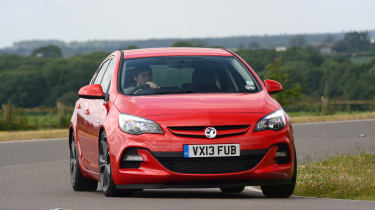Vauxhall Astra hatchback (2009-2015) - MPG, running costs & CO2
The Vauxhall Astra has higher emissions and fuel consumption than many of its family hatchback rivals
There are only two diesel engines in the Vauxhall Astra range that dip below 100g/km CO2 emissions, while none of the petrols emits less than 129g/km. And that’s not all, because the Astra is undercut by the Kia Cee’d and SEAT Leon on price.
Plus, the Vauxhall’s weak used values mean you’ll lose out when it’s time to trade your car in, too. On this point, though, this current generation of Astra is coming to an end, so deep discounts can be found if you look hard enough or haggle at your local dealer.
The entry-level 99bhp 1.4-litre petrol engine is best avoided, as it struggles to haul the Astra’s weight. Even so, it emits a respectable 129g/km of CO2 and claims just over 50mpg economy. The 133bhp 1.6-litre VVT is a slightly stronger performer, but emissions of 147g/km and fuel economy of 44.8mpg mean you’ll pay more to run it.
Turbocharged versions of these engines produce 138bhp and 178bhp respectively, yet cost even more in road tax and fuel. So if you want to save on your monthly motoring bills, particularly if you cover a higher annual mileage, then the diesels will be a better bet.
Yet the 1.3 and 1.7-litre CDTi diesels are as old as their petrol counterparts, so they lag behind VW’s TDI diesels when it comes to performance and smoothness. Still, when fitted with a system that automatically stops and starts the engine in traffic, the 1.3-litre emits 104g/km of CO2, while the 1.7-litre using the same fuel-saving technology emits 99g/km, meaning you’ll pay nothing for road tax. Neither are as efficient as the more modern 1.6-litre diesel, though.
For performance and refinement, the larger and newer 2.0-litre CDTi is a better bet. The downside is that in both standard 163bhp and twin-turbo 192bhp form, it trails the best in class for efficiency, with the lower-powered version emitting 119g/km and returning a claimed 61mpg. To make matters worse, the 163bhp engine is only available in pricey Tech Line trim and above, while the higher-powered engine is exclusive to the expensive BiTurbo trim.
It’s not all bad news, though, because Vauxhall also offers the Astra with its 1.6-litre CDTi engine. In entry-level 108bhp ecoFLEX form, it emits 94g/km of CO2 and is capable of 78.5mpg, while the more powerful 134bhp versions emit between 104 and 110g/km of CO2 depending on trim level. Better still, it matches the best in the class for refinement and feels quick enough on the road.
Insurance group
Like most of its rivals, the Astra range covers a wide spread of insurance groups. The cheapest models fall into group 9, while more powerful models are in group 24. In comparison, a handful of cheaper Ford Focus models fall into group 7.
Warranty
Vauxhall offers a fairly standard three-year/60,000 mile policy on all Astras.
Servicing
Unlike VW and Kia, Vauxhall doesn’t offer a pre-paid servicing pack with the Astra, so you’ll have to pay for each individual check-up. And while the brand guarantees a fixed price for scheduled maintenance, you’ll fork out more in the long run.












